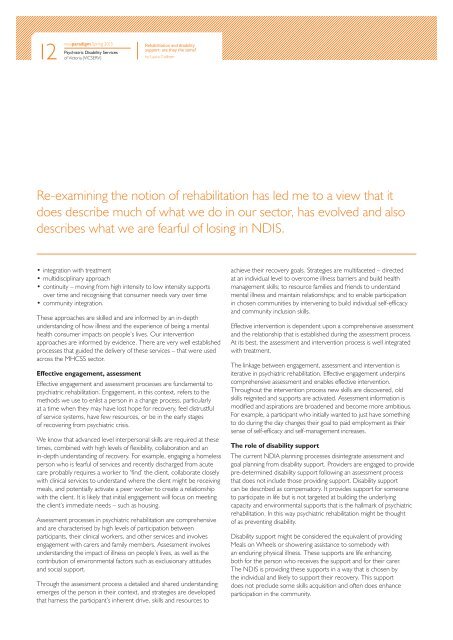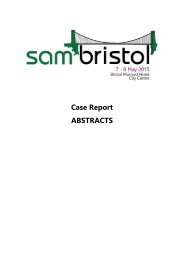UARbh
UARbh
UARbh
You also want an ePaper? Increase the reach of your titles
YUMPU automatically turns print PDFs into web optimized ePapers that Google loves.
12<br />
newparadigm Spring 2015<br />
Psychiatric Disability Services<br />
of Victoria (VICSERV)<br />
Rehabilitation and disability<br />
support: are they the same?<br />
by Laura Collister<br />
Re-examining the notion of rehabilitation has led me to a view that it<br />
does describe much of what we do in our sector, has evolved and also<br />
describes what we are fearful of losing in NDIS.<br />
• integration with treatment<br />
• multidisciplinary approach<br />
• continuity – moving from high intensity to low intensity supports<br />
over time and recognising that consumer needs vary over time<br />
• community integration.<br />
These approaches are skilled and are informed by an in-depth<br />
understanding of how illness and the experience of being a mental<br />
health consumer impacts on people’s lives. Our intervention<br />
approaches are informed by evidence. There are very well established<br />
processes that guided the delivery of these services – that were used<br />
across the MHCSS sector.<br />
Effective engagement, assessment<br />
Effective engagement and assessment processes are fundamental to<br />
psychiatric rehabilitation. Engagement, in this context, refers to the<br />
methods we use to enlist a person in a change process, particularly<br />
at a time when they may have lost hope for recovery, feel distrustful<br />
of service systems, have few resources, or be in the early stages<br />
of recovering from psychiatric crisis.<br />
We know that advanced level interpersonal skills are required at these<br />
times, combined with high levels of flexibility, collaboration and an<br />
in-depth understanding of recovery. For example, engaging a homeless<br />
person who is fearful of services and recently discharged from acute<br />
care probably requires a worker to ‘find’ the client, collaborate closely<br />
with clinical services to understand where the client might be receiving<br />
meals, and potentially activate a peer worker to create a relationship<br />
with the client. It is likely that initial engagement will focus on meeting<br />
the client’s immediate needs – such as housing.<br />
Assessment processes in psychiatric rehabilitation are comprehensive<br />
and are characterised by high levels of participation between<br />
participants, their clinical workers, and other services and involves<br />
engagement with carers and family members. Assessment involves<br />
understanding the impact of illness on people’s lives, as well as the<br />
contribution of environmental factors such as exclusionary attitudes<br />
and social support.<br />
Through the assessment process a detailed and shared understanding<br />
emerges of the person in their context, and strategies are developed<br />
that harness the participant’s inherent drive, skills and resources to<br />
achieve their recovery goals. Strategies are multifaceted – directed<br />
at an individual level to overcome illness barriers and build health<br />
management skills; to resource families and friends to understand<br />
mental illness and maintain relationships; and to enable participation<br />
in chosen communities by intervening to build individual self-efficacy<br />
and community inclusion skills.<br />
Effective intervention is dependent upon a comprehensive assessment<br />
and the relationship that is established during the assessment process.<br />
At its best, the assessment and intervention process is well integrated<br />
with treatment.<br />
The linkage between engagement, assessment and intervention is<br />
iterative in psychiatric rehabilitation. Effective engagement underpins<br />
comprehensive assessment and enables effective intervention.<br />
Throughout the intervention process new skills are discovered, old<br />
skills reignited and supports are activated. Assessment information is<br />
modified and aspirations are broadened and become more ambitious.<br />
For example, a participant who initially wanted to just have something<br />
to do during the day changes their goal to paid employment as their<br />
sense of self-efficacy and self-management increases.<br />
The role of disability support<br />
The current NDIA planning processes disintegrate assessment and<br />
goal planning from disability support. Providers are engaged to provide<br />
pre-determined disability support following an assessment process<br />
that does not include those providing support. Disability support<br />
can be described as compensatory. It provides support for someone<br />
to participate in life but is not targeted at building the underlying<br />
capacity and environmental supports that is the hallmark of psychiatric<br />
rehabilitation. In this way psychiatric rehabilitation might be thought<br />
of as preventing disability.<br />
Disability support might be considered the equivalent of providing<br />
Meals on Wheels or showering assistance to somebody with<br />
an enduring physical illness. These supports are life enhancing,<br />
both for the person who receives the support and for their carer.<br />
The NDIS is providing these supports in a way that is chosen by<br />
the individual and likely to support their recovery. This support<br />
does not preclude some skills acquisition and often does enhance<br />
participation in the community.




